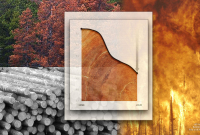Support strong Canadian climate journalism for 2025
Starting in 2023, credit card users with Canada’s largest community credit union will be able to track how much greenhouse gas pollution their purchases create.
A first in Canada, the move will allow Vancity Visa customers to see the estimated carbon footprint of everything they purchase using their credit card. The Carbon Counter, which will be part of the existing Vancity online site, won’t be able to break down emissions from a specific product. For example, the app will see that $100 was spent at a grocery store, and use the amount to make a generic estimate.
Customers can fine-tune the estimates by noting what kind of food they typically eat, which will help make the carbon calculation more accurate. Another example: after buying an airline ticket, users have the option to enter the length of their flight.

The credit union’s partner for the counter, Visa-acquired ecolytiq, compiled its Canadian carbon footprint calculations, which will be updated as users build the database.
“We are breaking new ground here,” said Ulrich Pietsch, ecolytiq co-founder and managing director.
The motivation for the counter came from customers wanting to know more about their spending habits, said Jonathan Fowlie, who leads Vancity's external relations and impact strategy. The credit union doesn’t invest in fossil fuels, unlike the Big 6 — RBC, BMO, CIBC, Scotiabank, TD and the National Bank of Canada. In general, Canadian banks have put $911 billion into fossil fuel companies whose products create planet-warming greenhouse gases, while experts say the opposite needs to happen if we’re going to meet our climate goals.
Fowlie said the move fits into the credit union’s overall push for green banking solutions.
“If you want that next level of information that says, how are my choices affecting the future that I want, we want to be there as the partner to provide you that information,” he said.
“Not necessarily saying one thing is good or bad. But rather, saying, the more information you have, the more able you are to make choices.”
Other cards outside of Canada have similar apps. MasterCard in the United States launched its carbon emissions tracker in 2021. Swedish fintech company Doconomy has a carbon limit for its credit card users.






Comments